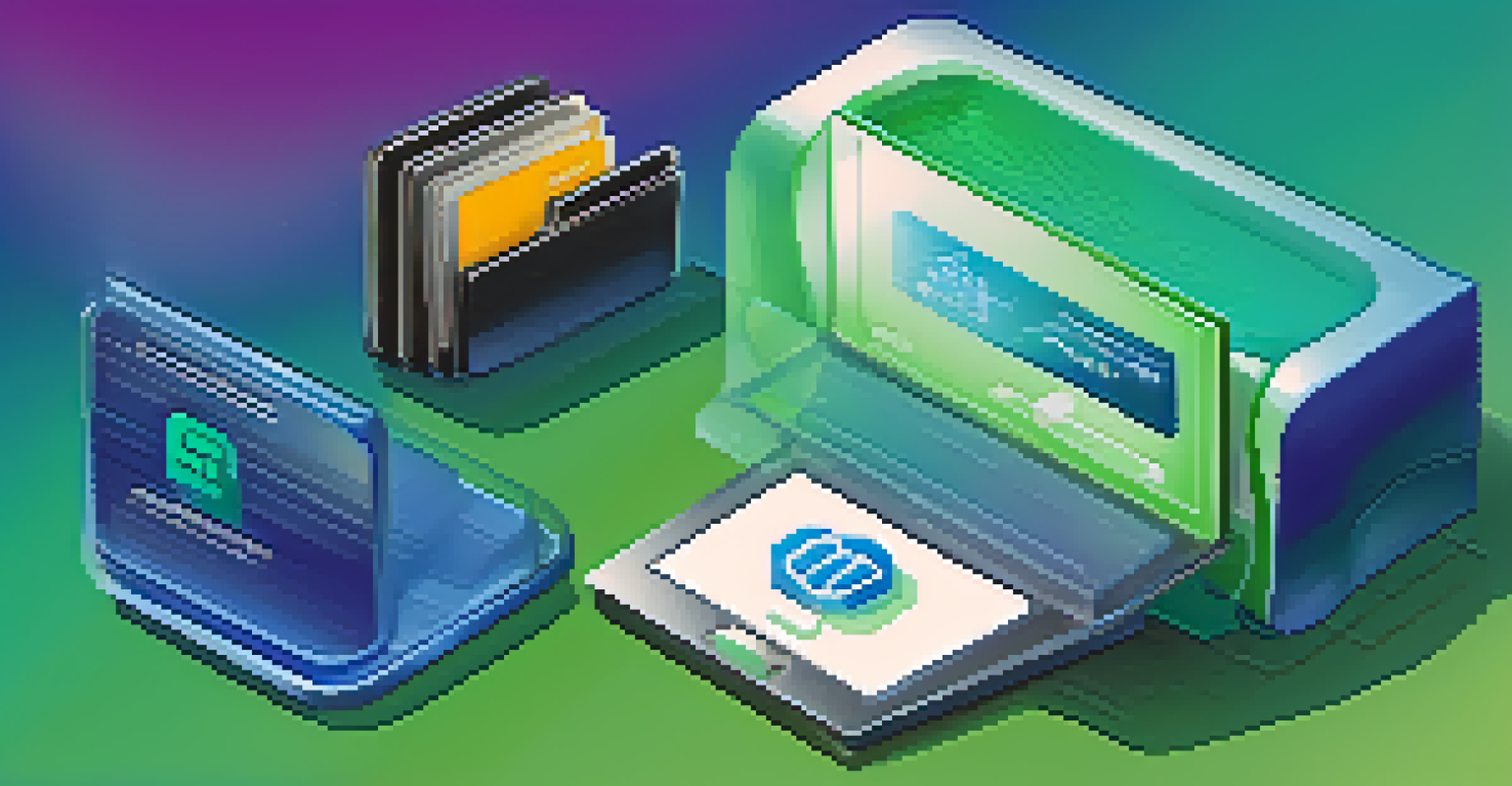Hot Wallets Explained: Pros and Cons for Bitcoin Users

What Are Hot Wallets in the Bitcoin World?
Hot wallets are digital wallets that are connected to the internet, allowing users to easily send and receive Bitcoin. Think of them like a checking account at a bank, where you can quickly access your funds and make transactions on the go. They are convenient and user-friendly, making them a popular choice for everyday Bitcoin users.
Security is not a product, but a process.
These wallets can take various forms, including software applications on your computer or mobile device, as well as online platforms provided by exchanges. This accessibility is a key reason why many Bitcoin enthusiasts prefer hot wallets for their daily transactions. However, the very features that make them convenient also come with certain risks.
To put it simply, hot wallets are great for quick access and ease of use, but users need to be mindful of the potential vulnerabilities that come with being online. Just like keeping cash in your pocket is handy but risky if you're in a crowded area, hot wallets require users to be vigilant about security.
The Convenience of Hot Wallets for Users
One of the main advantages of hot wallets is their ease of use. Users can send and receive Bitcoin with just a few clicks, making them ideal for those who are new to cryptocurrency or who frequently make transactions. Imagine being able to pay for lunch with just your phone—this is the level of convenience hot wallets offer.

Moreover, many hot wallets come with additional features like price alerts, transaction history, and even built-in exchanges for trading. This can enhance the overall user experience, as it allows individuals to manage their Bitcoin assets more effectively. The seamless integration of various functionalities can be a game changer for active traders.
Hot Wallets Offer Convenience
Hot wallets provide easy access for users to send and receive Bitcoin quickly, much like a checking account.
However, while convenience is a significant benefit, it's essential to keep in mind that it can sometimes come at the expense of security. Just as you wouldn’t carry all your valuables in your pocket without a care, Bitcoin users need to take precautions when using hot wallets.
Security Risks Associated with Hot Wallets
While hot wallets offer convenience, they also expose users to various security risks. Since these wallets are connected to the internet, they can be more susceptible to hacks and cyberattacks. Think of it like leaving your front door unlocked—it's an open invitation for unwelcome visitors.
The best way to predict the future is to invent it.
In fact, there have been numerous high-profile cases of exchanges and wallet services being compromised, leading to significant losses for users. This reality emphasizes the importance of choosing a reputable wallet provider and implementing additional security measures, such as two-factor authentication (2FA).
It's crucial for Bitcoin users to weigh the trade-offs between convenience and security. Just as you wouldn't ignore safety measures in your home, taking steps to protect your digital assets is equally important.
Comparing Hot Wallets to Cold Wallets
To better understand hot wallets, it's helpful to compare them to cold wallets, which are not connected to the internet. Cold wallets, like hardware wallets, are designed for long-term storage of Bitcoin and are considered more secure. Imagine a safety deposit box at a bank—it's not easily accessible, but it offers peace of mind for your valuables.
While hot wallets are perfect for those who actively trade or use Bitcoin for daily transactions, cold wallets are ideal for individuals looking to store their assets safely over the long term. This dual approach allows users to benefit from both convenience and security, depending on their needs.
Security Risks Are Present
While convenient, hot wallets are vulnerable to hacks and cyberattacks, necessitating careful security practices.
Ultimately, the choice between hot and cold wallets depends on how often you plan to use your Bitcoin. Just as you'd choose a wallet for your cash based on your lifestyle, consider how you plan to interact with your digital assets.
Best Practices for Using Hot Wallets
To make the most of hot wallets while minimizing risks, users should adopt best practices for security. This includes choosing a strong, unique password and enabling two-factor authentication whenever possible. Think of these measures as locking your doors and windows to keep your home secure.
Regularly updating your wallet software is also essential, as updates often include important security patches. Just like keeping your computer up to date can protect you from viruses, ensuring your wallet is current helps defend against potential threats. Additionally, always be cautious of phishing attempts and only download wallets from trusted sources.
By implementing these best practices, Bitcoin users can enjoy the convenience of hot wallets while safeguarding their assets. It's about finding the right balance between ease of use and security.
Real-Life Examples of Hot Wallet Usage
Many Bitcoin users rely on hot wallets for day-to-day transactions. For instance, someone might use a mobile wallet to pay for coffee or groceries, making it a practical choice for everyday spending. This real-world application highlights the wallet's utility in facilitating quick and easy transactions.
Moreover, some popular hot wallet options, like Exodus and Coinbase Wallet, have gained immense popularity due to their user-friendly interfaces and features. Users often share positive experiences about how these wallets have streamlined their trading and spending habits, creating a sense of community among Bitcoin enthusiasts.
Choose Between Hot and Cold Wallets
The decision to use hot wallets versus cold wallets depends on how frequently you plan to transact with Bitcoin.
These examples show that hot wallets are not just theoretical concepts; they are actively shaping how people interact with Bitcoin in their daily lives. As users continue to embrace cryptocurrency, hot wallets will likely remain a cornerstone of the Bitcoin experience.
Conclusion: Are Hot Wallets Right for You?
In conclusion, hot wallets offer a blend of convenience and accessibility for Bitcoin users while also presenting certain risks. They are ideal for those who frequently engage in transactions or want quick access to their funds. However, users must remain vigilant about security to protect their assets effectively.
Ultimately, the decision to use a hot wallet should align with your individual needs and risk tolerance. If you plan to trade often or use Bitcoin for everyday purchases, a hot wallet might be the right choice for you. On the other hand, if you're looking to hold your Bitcoin long-term, considering a cold wallet could provide added peace of mind.

As you navigate the world of Bitcoin, understanding the pros and cons of hot wallets will help you make informed choices about your digital assets. It's all about finding what works best for your unique situation.